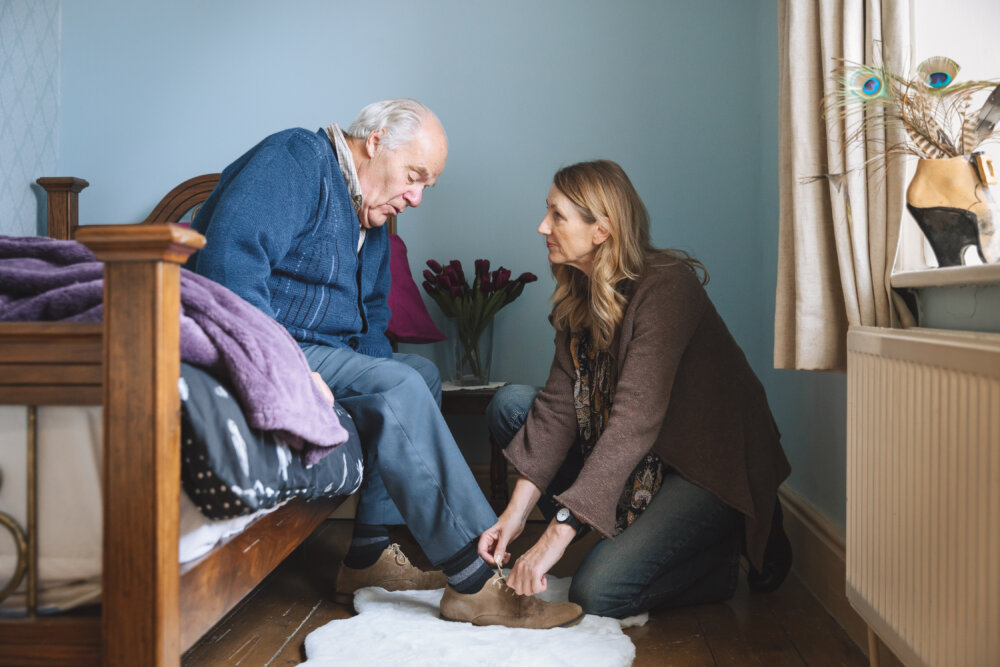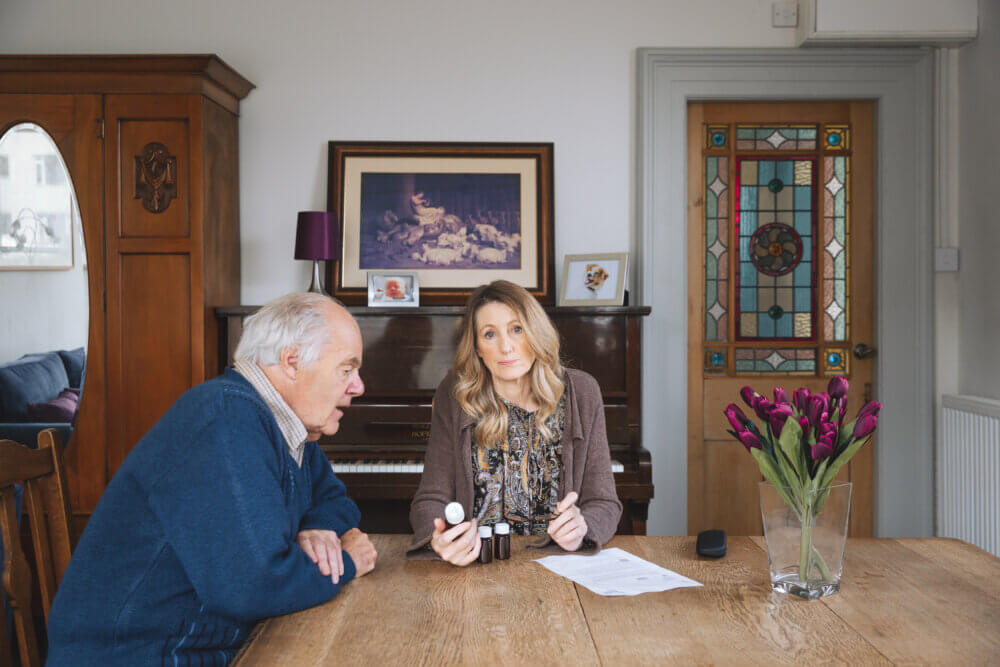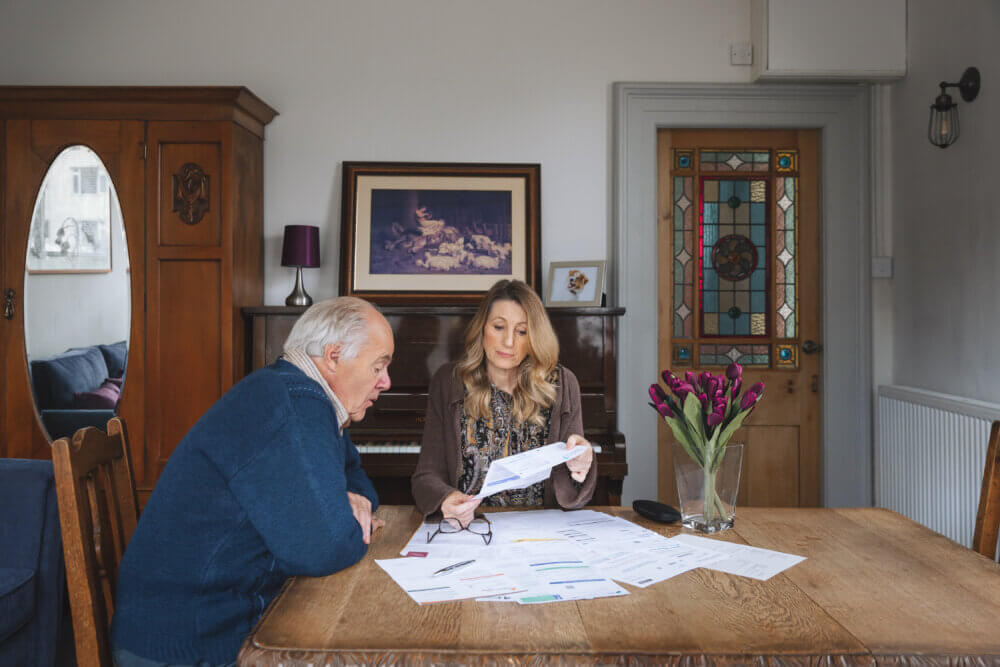Becoming a full-time carer for a family member

According to Carers UK, the 2021 Census estimated that around 5.7 million people are providing unpaid care in the UK, which could be taking a toll on their finances, mental health and more. If you are considering becoming a full-time carer for an older family member, it is important that you fully understand the reality of this, and the support you can receive to make this role manageable for you. Here, we are breaking down everything you need to know about caring for a family member full time, including how to tell when it’s time to switch to full-time care hours, the pros and cons of the role versus using home care services, how to get assessed to receive help from your local council, what financial support could be available to you, and more. At Home Instead, our aim is to help people age positively and in place by bringing expert care to their home. For nearly 20 years, we have been providing the highest standard of care, and creating industry-leading training programmes for our Care Professionals that are accredited by nursing and medical professionals. Today, we are the world’s largest global home care network, supporting over 100,000 older adults with personalised, tailored care at home. So whatever questions you have about becoming a full-time carer, we can help.
Full-time or part-time care: What does your family member need?
It can be difficult to determine whether or not an older family member needs care, let alone how much of it they need per week. If you are considering whether or not you should become a full-time carer for your loved one, or if part-time hours will suffice, some research will be required to figure out what works best for both of you. For clarity, officially being a full-time carer for a family member means you are caring for your loved one for at least 35 hours per week, and since caring is not a 9-5 role, this may be spread out across the week and include mornings, daytimes, evenings or overnight. Start by having a thorough, face-to-face conversation with your loved one to find out what they need, and organise a Care Needs Assessment through your family member’s local council. This means a professional will visit the home to assess the needs of your loved one and check if their home is suitable for them to stay in. You and your loved one should never worry about this assessment leading to a move to a care home; the council’s main objective will be to keep your older family member in their own home as long as possible, so they may suggest adaptations to the home to make it safe and accessible. They will also advise on the scope of care needed for your loved one, which will help you figure out if this is something you can provide, or if you need additional help. You may find our guide on how to tell if you need care helpful for knowing how much help your family member may need.

What can I do as a full-time carer, and what can’t I do?
If you are considering a full-time carer role, it helps to know what this involves and what it doesn’t, so you can make an informed decision on whether or not you can provide the necessary care. While there are no official requirements to become an informal carer for an older family member, understanding what this requires and what should be covered elsewhere can help shape the role you play in your loved one’s life. As a carer for your family member, you may be involved with things like:
- Personal care needs like getting dressed in the morning or using the bathroom
- Mobility support, such as helping your loved one move around their home
- Assisting with travel to appointments or social events, which will often involve driving
- Running errands, like grocery shopping
- Assisting with food preparation and cooking
- Helping to manage medication schedules
There are certain things you cannot do as a carer for your family member if you do not have a nursing qualification or appropriate training, including:
- Administering certain medications
- Giving injections
- Changing catheters
- Carrying out any other medical needs
Even if you believe you could do all of the above without issue, it is important to bring in the appropriately trained professional who can ensure no harm comes to your family member.

Pros and cons of becoming a full-time carer for a family member
It is a big decision to become a full-time carer for your loved one, so the below pros and cons list may provide some food for thought as you make the choice:
Pros of being a family carer
- You can spend more time with your family member and form a close bond
- Your family member may feel more comfortable being helped by you than by a stranger
- You may feel emotional satisfaction, fulfilment and a sense of purpose from helping someone else
- Compared to traditional employment, there can be flexibility in being a full-time carer for a family member, and you can aim to work hours around important things in your personal life
- You can acquire new skills and knowledge related to healthcare, personal support, and more
- Your family member can avoid being moved into a care home, nursing home or something else, and can instead remain in the comfort of their own home
- Care at home from a family member could be more cost-effective than home care, assisted living, care homes or nursing homes
- As a family caregiver, you can have more control over the decisions being made regarding the care and treatment of your loved one
Cons of being a family carer
- The emotional strain of providing full-time care to someone you love, which can come with feelings of guilt, resentment and worry
- The physical demands of being a carer, which can lead to stress, fatigue and burnout, and affect your wellbeing (you can reach out to the Carers UK helpline here for practical and emotional support)
- Lack of free time for your own interests, and lack of time spent with other family members
- Without formal training and support, you may not be able to cover all of the needs your loved one has, which can negatively impact their care
- You may need to give up your job or cut back on your hours in order to provide the amount of care needed, which can have financial implications
- Leaving the workforce to become a carer could impact your job prospects if you miss out on promotions, job opportunities and retirement savings
- Feelings of isolation can develop, as you may spend most of your time caring for your loved one and miss out on social events and time with friends
- If your family member has an unpredictable medical condition, this can make it very difficult for you to plan ahead in your own life
If, for you, the cons outweigh the pros of becoming a full-time carer for a family member, you may wish to look into home care services through your local council or private agencies that can offer flexible home care whenever you need it. Home care, such as what we offer here at Home Instead, can help you manage things like personal care and housekeeping, or could offer companionship so your loved one is never alone for too long. Whatever your needs and preferences, we can create a bespoke package to fit your exact needs.
Consider your loved one’s feelings about having you as their carer
Understandably, your family member may have reservations about you being their carer, particularly if this involves things like personal care which could feel embarrassing for some older people. Research shows 2 in 3 people aged 70 and over say they have not shared their plans for care with their adult children, so if you haven’t had a conversation with them about this already, it is best to do this as soon as possible so you understand their wishes. Listen to their reasons with an open mind, which may include things like:
- Fear of losing their independence
- Fear of loss of dignity
- Denial about becoming older
- Stigma due to being looked after by one of their family members
- Not wanting you to give up your job or miss out on your own life while caring for them
Never pressure them into receiving care from you if they don’t want this, as it is important to listen to their objections and personal reasons. Try to put their mind at ease if their reservations are to do with protecting your career or home life, and discuss with them all the reasons why you think it would be a good idea for you to step in as their full-time carer. If your older family member continues to challenge the need for ongoing support or care in general, our guide on how to handle an elderly relative refusing care may be helpful.

How to arrange an assessment and seek support
If you have decided to become a full-time carer for an older family member, the first step is usually organising a Care Needs Assessment with their local council, as this can answer any initial questions you have about becoming a carer, assess exactly how much care your loved one needs, and make recommendations on things like available services, funding and other forms of support. Once the assessment has been done, a care plan will be created by the person in charge of your family member’s case within the local council, and this will include a detailed plan of action that you can use to make decisions. You will find more information on this in our guide to care plans.You can then decide on the best choice of care for your loved one. This might mean asking questions like:
- Can my family member remain in his/her own home? (Our guide on the benefits of home care vs a care home could be of help with this)
- Are any home adaptations needed to keep their home safe?
- What exactly does my family member need help with each day/week?
- How many hours of care are required each week?
- Can I manage these hours myself on a part-time basis?
- Would it be best for me to take on a full-time carer role?
- Do I need to seek the help of home care services to fill in any gaps in care?
If you feel home care could help you as you make the transition to full-time carer, or you believe you could benefit from regular respite care from a home care service, we’ve also got useful guides on how to choose and arrange home care, and the role of live-in respite care.

What if medical care is needed?
As mentioned above, certain medical care needs must be undertaken by the registered nurse in charge of your loved one’s health care, who can visit them at home to provide what they need. You can arrange this, discuss any medical requirements, and set up a regular medication schedule with their doctor.
Although you cannot provide medical care to your loved one, it can help to research their condition so you and they feel confident that their regular caregiver understands what needs to happen, and can recognise important warning signs if they arise.

How does Carer’s Allowance work?
Carer’s Allowance isa weekly payment to help support you if you care for someone at least 35 hours a week, and if they get certain benefits such as Personal Independence Payment and Attendance Allowance. You may be eligible for Carer’s Allowance if you meet these hours helping with tasks such as washing, cooking and taking the person you care for to doctor’s appointments. This is the case even if you share caring duties with others.
You could receive up to £76.75 per week, so this is definitely worth looking into if you are becoming a full-time carer for a family member. Plus, if you are a carer and claim Pension Credits, you could receive an extra payment – known as Carer Addition – of up to £42.75 a week. These payments can be backdated by up to 3 months, but the sooner you look into this the better.
You can check the GOV.UK website for more information to see if you qualify, and to apply.
As well as checking if you are entitled to Carer’s Allowance, you should research any other administrative tasks you need to do. These could include registering as a carer with your GP surgery which could give you access to additional support and resources, and telling your employer about your caregiving role so they can be flexible with your workload and hours.
If you have questions about becoming a full-time carer, or about enlisting the help of part-time or respite carers to fill in any gaps in care that you or your family cannot provide for your loved one, Home Instead can help. We understand the difficulties in transitioning to becoming a carer for a loved one, and we offer personalised packages that encompass all of the needs of your family member so you always know they are in safe hands.
Our Care Professionals are highly trained to deliver the individualised service you are looking for, so get in touch to discuss what you’re looking for. We’re an award-winning home care provider and part of a worldwide organisation devoted to providing the highest quality relationship-led care for older people in their own homes. Arranging care for yourself or your loved one shouldn’t be stressful, so whatever questions you would like answered, feel free to reach out to the Home Instead team to discuss your needs.


Diane WIlliams , Head of Quality & Standards
Before joining Home Instead, I built a comprehensive career in the social care sector, beginning in 1991 as a frontline care worker and advancing to senior leadership roles across both private and voluntary sector businesses.
Throughout my career, I have supported diverse care groups in a variety of settings, including community, residential, nursing, and secure environments. My experience spans working with older adults, including those living with dementia; individuals with physical disabilities and complex, long-term health needs; people with learning disabilities, including autism; individuals with enduring mental health challenges; individuals with current or past substance use and those with forensic backgrounds.
In 2002, I qualified as a social worker and have since maintained my professional registration with Social Work England.